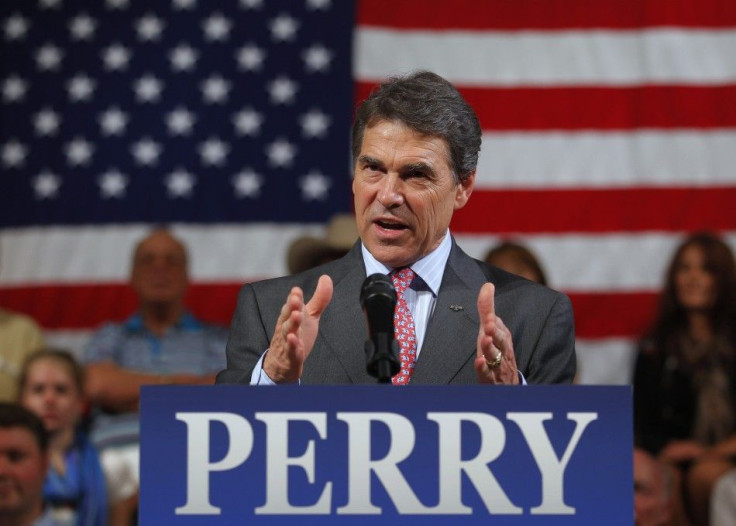Rick Perry Tax Plan: Touting Job Creation, Perry 'Doesn't Care' If Plan Is Huge Tax Cut for Rich

Media outlets have been abuzz since Gov. Rick Perry R-Texas, became the latest Republican presidential hopeful to release a tax plan, which aims to reform the U.S. tax code by establishing a 20-percent flat tax rate. While some have implied that Perry has imitated his GOP rival Herman Cain -- who has gained national recognition through his own easy-to-process 9-9-9 flat tax plan -- Cain at least had the sense to avoid admitting what his critics pointed out: that his tax reform plan gave massive tax breaks to the nation's wealthiest citizens.
Perry's plan would call for extensive cuts in federal programs and grant major tax cuts to the wealthy by eliminating estate and capital gain taxes, while also lowering the rate the highest-earning Americans pay on most of their income, which is currently set at 35 percent. The plan also caps corporate and income taxes at 20 percent, while retaining deductions for mortgage interest and charitable donations as well as state and local taxes for families earning less than $500,000 a year. Moreover, standard deductions would increase to $12,500 for taxpayers and their dependents.
Perry said anyone would have the option of filing under the current tax code -- where most middle-class taxpayers reportedly pay a 15 percent top rate -- but would receive lower personal exemptions.
Upper Income Groups Would Receive Another Tax Cut
While Perry's plan offers significant tax breaks for middle-income earners, several critics have pointed out that, similar to previous flat-tax proposals, those savings are considerably more significant among the highest-earning Americans by slashing their income tax rate to 20 percent and completely eliminating investment income from taxation. When CNBC's John Harwood pointed that out to Perry on Tuesday morning -- questioning whether the plan was advisable due to the current state of income inequality in the U.S. -- Perry said the issue was moot since the ultimate goal of his tax plan is to increase employment by making it easier for job creators to expand their companies.
We're trying to get this country working again. And that's what I focus on ... Those that want to get into the class warfare and talk about 'oh my goodness,' there are going to be some folks here who make more money out of this or have access to more money, I'll let them do that, Perry said.
Harwood then brought up that the savings for those at the top is hundreds of thousands, maybe even millions of dollars, to which Perry had a simple message: He doesn't care.
But, I don't care about that. What I care about is them having the dollars to invest in their companies, to go out and maybe start a business because they have the confidence again that they actually get to keep more of what they work for, the one-time GOP frontrunner said.
While Cain initially denied his 9-9-9 plan cut taxes for the highest-earning Americans at a drastically higher rate, Perry has not, instead insisting that a lower tax burden for the rich is the key to boosting job creation.
Whether or not an enormous tax reduction for the wealthiest demographic will actually spur real economic change is questionable, according to economists. Jared Bernstein, a former adviser to Vice President Joe Biden and a senior fellow at the Center on Budget and Policy Priorities, told Bloomberg Perry's plan is a complicated beast that will not necessarily simplify the tax code, as Perry has implied.
The thing that makes the tax system complex is not graduated rates, Bernstein said. That's one of the big misunderstandings of this flat-tax discussion. You can have as many rates as you want and figure out what you owe on a postcard.
While Perry's plan has won the support of Grover Norquist, the president of Americans for Tax Reforms, Leonard Burman, a former Treasury Department official, told Bloomberg he thought the plan was political pandering at its worst. Burman added that the plan doesn't seem like a serious policy proposal.
Income Inquality: Does It Lead to Lower GDP Growth?
Cross-national data has shown there is a correlation between income inequality and lower economic growth. For example, by using data from the World Bank and the Organization for Economic Cooperation and Development for a sample of 65 countries, the economists Alberto Alesina and Dani Rodrick found there were lower rates of economic growth during the early 1990s in countries where higher shares of national income went to both the top 5 percent and top 20 percent of earners. However, greater shares for low-income and middle-class populations were associated with higher rates of growth -- the opposite of the trickle-down theory advocated by many conservatives.
Tax reform plans reminiscent of trickle-down policies have been popular among the GOP candidates. In addition to Perry and Cain, Newt Gingrich has called for an opt-in flat tax, while former Govs. Mitt Romney and Jon Huntsman have also proposed tax reform plans that eliminate all taxes on capital gains and investments.
© Copyright IBTimes 2025. All rights reserved.





















